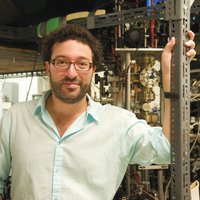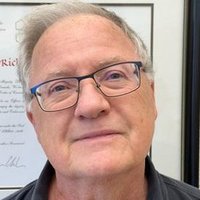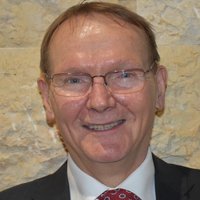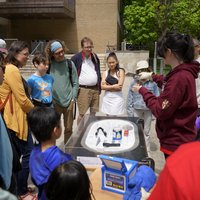In the media: Theoretical particle physicist Prof. Yonatan Kahn brings his quantum search for dark matter to U of T

John Moffat honoured for lifelong pursuit of physics
Throughout his career, John Moffat has challenged the mainstream in pursuit of bold new ideas.

Congratulations to Prof. Miriam Diamond on winning a 2025 Dorothy Shoichet Award

In the Media: Ph.D. student Aleksandra Elias Chereque discusses her research on snow cover observations

In the Media: Prof. Paul Kushner comments on government plans to dismantle the National Center for Atmospheric Research in Colorado

In the Media: Prof. Aephraim Steinberg discusses advances in Quantum Computing in Canada in the Financial Post

In the Media: Ph.D. student Takahiro Tow shares his team’s atomic clock breakthrough

Kyle Thompson awarded Xanadu Award for an Outstanding Publication by a Ph.D. Student

Prof. Amar Vutha's team have developed the first of a new generation of optical atomic clocks
The new technology would help advance the replacement of legacy cesium clocks that have been in use for decades to define the length of the second and ensure precise timekeeping. For full details on his research:
https://www.artsci.utoronto.ca/news/breakthrough-atomic-clock-technology-promises-advances-precise-timekeeping-and-fundamental

Renowned Scientist Sara Seager is joining CITA with cross appointment in Physics

Prof. Sajeev John Elected to U.K.’s Royal Society

Valetin Crepel Awarded 2025 Blavatnik Regional Award for Young Scientists

Prof. Philip Heron of UTSC leads an outreach program providing science education to people in prison. (CBC radio: Quirks & Quarks)

Undergraduate Jillian Escobar spent summer at the Hadron Collider in Switzerland through Summer Abroad Program

Grad student Takahiro Tow demonstrates world's first cryogenic single-ion trap for an atomic clock

Physics student wins international poster prize
Congratulations to Ph.D. student, Xiang Zou Lo (supervised by Prof. Prof. Hoi-Kwong) who recently won the Best Student Poster Award out of 100 posters at the conference AQIS 2025 in Hong Kong with the poster entitled “Algebraic Topology behind Topological Quantum Error Correction".

Physicists confirm existence of elusive quantum spin ice
A team of physicists from the University of Toronto and Rice University have uncovered the strongest evidence yet for the existence of a quantum spin ice — an exotic form of matter with potential applications in quantum computing and superconductors.

Congratulations to Gabriel Andolfatto on receiving the Momentum Builders Scholarship

Congratulations to Prof. Kent Moore on his appointment as University Professor

Congratulations to Prof. Dick Bond who has been awarded the Shaw Prize in Astronomy 2025

Pekka Sinervo has been appointed a Fellow of the Canadian Association of Physicists

Annual Emeritus Reunion Lunch!
The Annual Emeritus Reunion Lunch was held on Friday, May 23, 2025 at the Faculty Club.

Physics Opening for Doors Open Toronto on Saturday, May 24
The department will be opening its doors on Saturday, May 24 for the annual outreach event that showcases the department space along with Physics demos and talks.

Congratulations to U of T ATLAS team
Congratulations to the U of T ATLAS Team for their 2025 Breakthrough Prize in Physics.

The Legacy of MOPITT
In the Media: EAPP Emeritus Professor James Drummond discusses the legacy of the MOPITT instrument.


